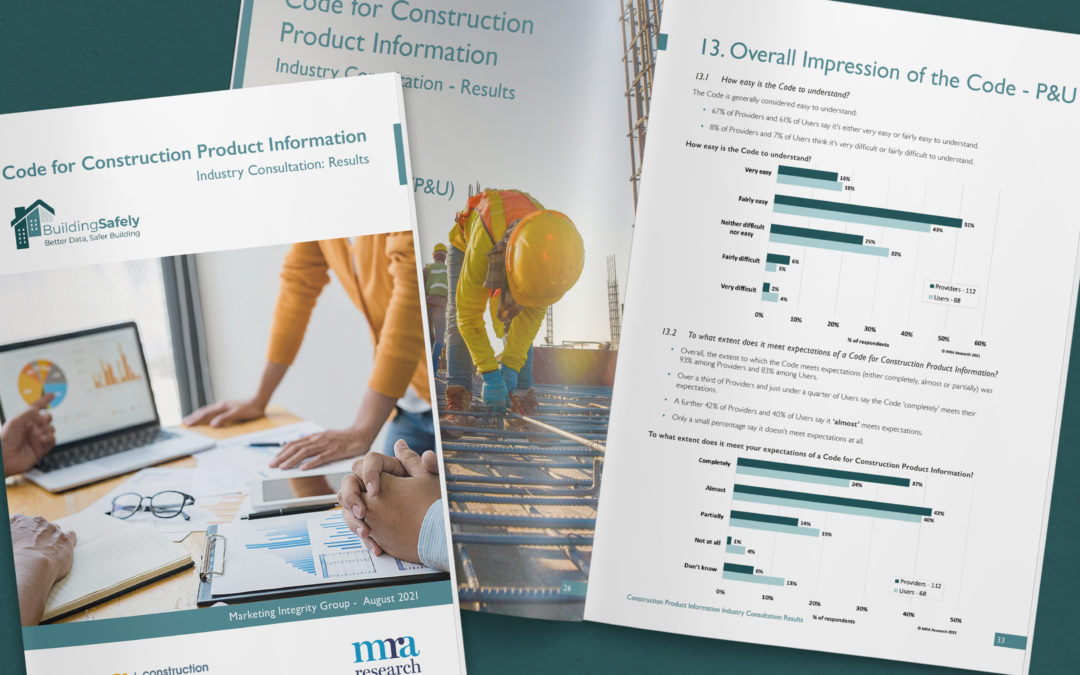
by Clair Mooney | 7 Oct, 2021 | Main News Feed
Later this month the Chancellor of the Exchequer will set out his Autumn Budget and Spending Review to Parliament.
It should not be underestimated how important this is both to the UK economy, and to companies from across the UK construction industry.
This Spending Review will set the money available to public bodies to deliver their priorities over the coming three years. As such it is the moment at which strategic priorities and budgets are set for government departments. As outlined in the recent construction pipeline publication, many capital programmes are already supported by long-term funding settlements. As a result, the Spending Review can be expected to add further detail to government’s approach to investment paid for by the public purse.
The Construction Leadership Council has written to the Chancellor outlining how the Government can get best return on money committed to construction delivery and maintenance.
We need to be clear on the circumstances in which this letter has been prepared. Last year we all welcomed the enormous and unprecedented financial interventions that the Government delivered to support companies and employees through the biggest crisis in generations. We also welcomed the significant investment commitment in last year’s Spending Review. Inevitably however, the pandemic has left the public finances in an extremely challenging state.
It may surprise people in the industry that this has not led to the preparation of a long list of new projects we want the Government to back. We all know that there is a huge amount to be done, not least in accelerating the decarbonisation of the UK’s existing building stock, and it is clear that construction is a huge driver of economic growth.
Put simply, there is little point in presenting the Government with a further list of works that almost inevitably would have to be ignored, and in the process losing the opportunity to emphasise those things that the government could and should continue to invest in. We should remember that the Government has already displayed its confidence in the industry through its support to building back better including major investments including HS2 and the Health Infrastructure Plan.
We hope and expect that the Chancellor will use the Spending Review to commit to maintaining existing levels of investment beyond the current spending review period. This will sustain employment and growth in a way that few other industries can – levelling up communities large and small across the whole of the UK.
Our second ask is linked to the Government’s commitment to deliver net zero carbon by 2050. We know as an industry that one of the single largest interventions to achieve this would be a programme to retrofit the UK’s existing housing stock, driving carbon out of the heating and running of homes.
We are not asking for money at this stage but instead something that is in the long term more important. In advance of the completion of the Heat and Buildings Strategy, we are calling for the national retrofit programme to become a strategic priority for government in the coming three years. This will mean that it is an area of significant concern for senior ministers to work with industry, developing a fully funded programme paid for both by public and private sector, to secure a step change in the carbon performance of the built environment.
We have welcomed the work that has already been done by the Construction Innovation Hub to improve the productivity of industry. Building on this work will act as an enabler of the retrofit programme, driving the innovation to push down cost. For this reason, our only specific new funding ask is that the Government continues to match industry support for the Hub to develop new and better approaches to retrofit. This support will also underpin ongoing work to develop digital twins of UK built assets, allowing them to be much more effectively managed, securing lower long-term costs and much better carbon performance.
We know that to deliver all this we will need to upgrade our skills. We are not calling for a specific funding intervention for construction but instead have asked that the government sustains its efforts to promote future skills by maintaining existing support for employers to take on apprenticeships and continues to refine the operation of the Apprenticeship Levy.
The CLC’s mission is to support the sector to provide leadership and to collaborate to deliver industry change. The Government plays a huge rule in delivering this change – we hope that the Spending Review will help us take the next big step towards a better industry for everyone.

by Clair Mooney | 6 Oct, 2021 | Skills
The Education and Skills Funding Agency have updated the guidance on apprenticeships initial assessment to recognise prior learning. The updated guidance supports providers to tailor apprenticeship programmes to meet apprentices’ needs by establishing the correct starting point for each apprentice. It also contains important information for employers and apprentices about the need for, and importance of, initial assessment and recognition of prior learning.
In response to industry feedback, they have included more information about how to conduct the initial assessment and assess prior learning and experience in accordance with the policy intent and the apprenticeship funding rules. The update includes:
- expanded content on why it is important to conduct initial assessment
- a new section on the benefits of recognising prior learning
- expanded content on how to conduct initial assessment and how prior learning and experience can be assessed – including a case study
- a new section on what prior learning and experience should not be included
- expanded content on who is responsible for the recognition of prior learning and experience
- a new section on how other technical education programmes that are aligned to occupational standards should be taken account of
This guidance will be kept under review as further training programmes that are aligned to employer designed occupational standards are introduced.

by Clair Mooney | 1 Oct, 2021 | Health and Safety
HSE’s inspectors across Great Britain will be targeting construction firms to check that their health standards are up to scratch during a month-long inspection initiative, starting on Monday 4 October 2021.
This year inspections will focus on respiratory risks and occupational lung disease, looking at the control measures businesses have in place to protect their workers’ lungs from construction dust including silica, asbestos and wood dust. This is part of HSE’s longer term health and work strategy to improve health within the construction industry.
While the primary focus will be on health during this programme of inspections, if an inspector identifies any other areas of concern, including immediate safety risks, they will take the necessary action to deal with them.
Inspectors will be looking for evidence of employers and workers knowing the risks, planning their work and using the right controls. If necessary, they will use enforcement to make sure people are protected.
The initiative will be supported by HSE’s WorkRight campaign, aimed at influencing employer behaviour by encouraging builders to download free guidance and advice, increasing knowledge and capability to protect workers’ health.
More than 3,500 builders die each year from cancers related to their work, with thousands more cases of ill-health and working days lost.
HSE’s chief inspector of construction, Sarah Jardine, said:
“Around 100 times as many workers die from diseases caused or made worse by their work than are actually killed in construction accidents.
“Our inspection initiatives ensure that inspectors are able to speak to duty holders and visit sites to look at the kind of action businesses in the construction industry are taking right now to protect their workers’ health, particularly when it comes to exposure to dust and damage to lungs. These are mature health challenges that the industry ought to be managing effectively.
“There are a few simple things that everyone can do to make sure they are protecting their health and their future. Be aware of the risks associated with activities you do every day, recognise the dangers of hazardous dust and consider how it can affect your health. We want businesses and their workers to think of the job from start to finish and avoid creating dust by working in different ways to keep dust down and wear the right protective equipment.”
HSE is being supported by the Health in Construction Leadership Group (HCLG) and Tier 1 industry contractors. Throughout October 2021, HCLG members will carry out more than 1,000 site visits to assess the effectiveness of measures in place to controls workers’ exposure to respiratory risks from dust. Findings from site visits and a survey will allow industry to feed into HSE’s broader commitment to improve the health of construction workers by providing HSE with a wider dataset to evaluate ongoing practices across industry.
HSE and industry Insights will support HSE’s strategic plan to broaden the range and depth of future regulatory health interventions.
For more information on the programme of inspections visit the Work Right campaign website: https://workright.campaign.gov.uk/campaigns/construction-dust/

by Clair Mooney | 30 Sep, 2021 | Health and Safety
A new international standard on mental health, ISO 45003, has been published to provide guidance on managing the psychological health of the workforce as part of an occupational H&S management system. It is available free of charge to SMEs and other organisations can purchase it from BSI.

by Clair Mooney | 30 Sep, 2021 | Labour, Material Shortages
The Government has announced a package of measures to tackle the shortage of HGV drivers, which is causing widespread disruption across supply chains. It includes training 4,000 new drivers, offering 5,000 temporary visas for HGV drivers in the run up to Christmas, and using Ministry of Defence examiners to increase HGV testing capacity.
Build UK continues to work with the Chartered Institute of Procurement & Supply (CIPS) to publish up‐to‐date information on the availability of key construction materials. For the first time, each material has been RAG‐rated on price as well as availability, and timber and concrete are currently ‘red’ for both. Only cladding and paint are rated ‘green’ on availability and price.
To help members manage the contractual impact of a range of Brexit‐related issues, Build UK has worked with Wedlake Bell LLP to produce guidance on Your Contracts Post‐Brexit, which provides comprehensive advice on dealing with delays to time and programme, price and currency fluctuations, and sourcing materials and legal ownership.

by Clair Mooney | 30 Sep, 2021 | Main News Feed
To help contractors understand their level of responsibility when it comes to design, the Finishes and Interiors Sector (FIS) has published a new guidance note, How to manage design liability and understand your responsibility
Prepared by construction law specialist Anderson Strathern for the FIS and aimed at contractors who may be assuming design, the new guidance note brings clarity to the risks and liabilities associated with their role in the contract.
The new FIS guidance note will help contractors understand the role of the Construction (Design and Management) Regulations 2015 Designer, the terms of a contract, how to protect themselves and the importance of adequate and appropriate insurance to cover risk.
Commenting on the launch of the new guidance, Iain McIlwee, Chief Executive of the FIS said:
“We are seeing design liabilities pushed through the supply chain more and more with roles and responsibilities increasingly blurred. The new FIS guidance note will help contractors understand their legal responsibilities, particularly when it comes to design issues apparent during construction.”
This brief guidance also provides information on health and safety issues and why it is important to have a net contribution clause and a cap on liability clause within a contract.
FIS members can access a range of services to support them in managing the complexities of contracting and supplying products into the construction market, this includes template contracts, guidance on standard terms, support in dealing with disputes and a raft of best practice advice.
The guidance note is available from the FIS website at https://www.thefis.org/knowledge-hub/contractual-and-legal/

by Clair Mooney | 30 Sep, 2021 | Health and Safety
HSE is continuing to carry out spot checks and inspections on all types of businesses, in all areas, to ensure they are working safely to reduce the risk of COVID.
During the spot checks, HSE provides advice and guidance to manage risk and protect workers, customers and visitors. However, where some businesses are not managing this, we will take immediate action.
This can range from providing specific advice, issuing enforcement notices, and stopping certain work practices until they are made safe. Where businesses fail to comply, this could lead to prosecution.
HSE recently prosecuted a construction contractor following a spot inspection.
Working to manage the transmission of COVID means businesses need to conduct a risk assessment to understand the measures they may require to protect workers and others. Further information is available on working safely during the pandemic.

by Clair Mooney | 30 Sep, 2021 | Sustainability, Transformation
- Do you have what it takes to help save the world?
- Can you bring your creativity to solve the biggest question faced by the construction sector?
- Are you itching to be at the heart of efforts to deliver net zero carbon?
If you can answer ‘yes’ to all of these questions, and you are a young professional working in construction then you are invited to take part in the Construction Leadership Council’s Dragons’ Den competition for proposals to crack down on carbon.
Your ideas are needed for how the industry can make a step change in its carbon performance. All proposals are welcome and encouraged.
If you have a proposal that is developed to the point where it could potentially be rolled out with industry with the right backing, then the CLC can bring that. The Construction Leadership Council (CLC) reaches into every part of our great industry, and it can leverage its power to make your proposal a reality.
To secure this support, you are invited to step into the CLC’s Dragons’ Den where shortlisted applicants will be able to present their proposals to industry leaders.
Alongside support to get your idea off the ground the winning proposal will also bag a £1000 cash award donated by the Builders Merchants Federation, and mentoring with a CLC Business Leader.
Are you ready to that enter the CLC Dragons’ Den? If so, please go here for more details. Closing date midday 8 October.

by Clair Mooney | 29 Sep, 2021 | Main News Feed
On 29 September 2021, the UK government updated its information on Parallel Trade Between the UK and the EEA with regards to Intellectual Property. This can be viewed here.
The IP rights in goods placed on the UK market by, or with the consent of the right holder after the transition period may no longer be considered exhausted in the EEA. This means that businesses parallel exporting these IP-protected goods from the UK to the EEA might need the right holder’s consent.
The IP rights in goods placed on the EEA market by, or with the consent of the right holder after the transition period will continue to be considered exhausted in the UK. This means that parallel imports into the UK from the EEA will be unaffected.
The UK government is currently considering what the UK’s future IP exhaustion regime should be. The government ran a consultation for 12 weeks from June to August 2021 and is now carefully considering consultation responses. Once the analysis of consultation responses is complete, the government will make a decision and choose the option which best serves the UK economy, the UK public and the UK as a whole. We are aware that many businesses and consumers are interested on this matter so when that decision is made, we will work as quickly as possible to make an announcement.

by Clair Mooney | 25 Sep, 2021 | Labour, Skills
We need an extra 217,000 workers over the next five years to ensure construction can continue to thrive and apprenticeships will help futureproof the industry and provide an excellent route to secure a skilled, diverse future workforce.
There are a number of schemes that are supported by Levy and are free to access, and with your involvement will help bring new talent into the industry.
Here you can find out the support available from CITB and the UK Government to take on an apprentice.

by Clair Mooney | 24 Sep, 2021 | Insurance
FIS has been listening to its members who have felt increasingly frustrated by the lack of real support from the insurance industry, as appetite has become restricted and where cover is available it is universally increased and, in some circumstances, it has become uncommercial and very difficult to place.
In a survey conducted by FIS at the start of the summer it was identified that around 90% of members have experienced rising insurance costs over the past three years. Further that, over half of the respondents had experienced difficulty in securing insurance and 60% of respondents believe that the price of insurance is now a problem to their business. Key concerns raised through our research were a need to switch to aggregate cover in order to get any insurance at all and having to deal with onerous endorsements within Professional Indemnity Insurance that prohibited certain key tasks, curtailing those jobs that our membership could take on.
This cannot continue; in reaction to these findings and further dialogue with our members, FIS has reviewed the options and is planning further intervention including setting up a new facility to broker insurance for members. The aim is to establish FIS Insurance Services (FIiNIS) as ‘cooperative’ insurance brokerage and risk management advisory service. The brokerage will be run in partnership with Construction Shield and will support FIS in advising on and of providing insurance-related services.
Commenting on the announcement FIS CEO Iain McIlwee stated:
“We keep coming back to the realisation that there is a fundamental breakdown in the way that we are engaging with the insurance sector. This needs to start with a clearer understanding of the risks, interrogating claims data and looking to support an ongoing improvement in quality and risk management. This isn’t just about cheaper cover, but about transparency and a new and holistic approach to risk management that will help us support individual members and sectoral change.
Through this open brokerage approach, built around the FIS PPP Quality Framework, our aim is to establish a new relationship with the insurance sector, separating legacy from future works and targeting better provision built around the needs and risks of our sector. By doing this as a co-operative we can share the upside back with those companies that are effectively managing the risks.
In time it is an aspiration to look at the potential to evolve this co-operative approach to the natural progression of becoming an insurance mutual – we are a vast industry and taking a position in our own risk makes a lot of sense.”
Over the next few months, FIS Insurance partner Construction Shield will be reaching out to members, helping to analyse the cover they have and vitally don’t have with a view to offering tailored and targeted packages exclusively to companies signed up to the FIS Ongoing Vetting Process.
James Reid, Chief Executive at Construction Shield said:
We are delighted to be in partnership with the FIS on this project to help re-address the balance between genuine risk management and risk transfer. It is clear that the FIS leadership have heard and reacted to the voice of its membership and it is for the membership to now join together strategically to put the buyers of insurance in a stronger and more stable bargaining position in a hardening ‘traditional’ insurance market. With genuine risk management, the championing of best practise and greater understanding of activities there is no reason why insurers and insureds alike cannot come to a commercial sensible compromise between the availability of cover and the cost of proper risk transfer. We, like FIS, are excited to be able to build this meaningful project together for the benefit of its membership.

by Clair Mooney | 24 Sep, 2021 | Skills
FIS has established a network of FIS Construction STEM Ambassadors to help expose young people the wide range of opportunities available in our sector. We have linked up with STEM Construction and the Built Environment Ambassadors programme to ensure our network is supported by their resources and training and taps in to a wide range of activities which includes school presentations, careers talks and mentoring.
There are around 700,000 annual school leavers, so we need an army of ambassadors to get to all of them!! The CLC’s Industry Skills Plan includes a commitment to recruit 7,000 Construction STEM Ambassadors, as FIS represents around 10% of the sector, to do our share of the lifting we need 700.
The STEM Ambassador programme provides vital training, tools and support – giving you confidence that the message is right and we are working (and learning) consistently as a sector. Becoming an ambassador will also plug you in to the STEM network and will open up opportunities to visit schools and careers fairs (you need to commit to doing at least two of these a year as part of your pledge).
At FIS we are here to help and have members of our team who have completed the training and are actively working as ambassadors, we are maintaining a network of ambassadors and are using this network to better understand how to target our approach and to develop the resources they need to get the message across.
Anyone working in the sector can be a STEM ambassador, from people who have just completed an apprenticeship through to the CEO/Owner. We need to represent all roles and opportunities available and really this can be anyone working in your business with a passion for our industry who can get this message across and wants to help spread the word (and build your links with local schools and colleges).
FIS who members who want to understand get cracking simply need to sign up online to become STEM Ambassador and advise marieflinter@thefis.org that you have started your journey.
Further information on how to get involved can be found in this short film. If you like to have a chat about what is involved before committing please call Marie Flinter at FIS on 0121 707 0077 or email marieflinter@thefis.org and we will be happy to help.

by Clair Mooney | 24 Sep, 2021 | Building Safety Act, Technical
The Construction Products Association (CPA) has published the
Code for Construction Product Information to ensure that reliable and consistent product information is provided by manufacturers.
Developed in response to the recommendations made in Dame Judith Hackitt’s Building a Safer Future report, the code sets the industry benchmark for how product information is presented and marketed so that it is clear, accurate, up‐to‐date, accessible and unambiguous. It contains 11 clauses including transparency of information on performance and proof of stated claims, and manufacturers can now register their interest in being verified against the code later this year. Guidance has been published to assist with the verification process.

by Clair Mooney | 24 Sep, 2021 | Building Safety Act
The Building Safety Bill is being debated in Parliament after MPs tabled dozens of amendments, including one which would ensure that all owners of residential units in higher‐risk buildings are classed as ‘relevant persons’ and therefore required to be supported by the regulator. The original definition of ‘relevant persons’ proposed in Part 4 of the Bill included only residents, building safety managers and duty holders. Other amendments would allow the recovery of VAT on building safety remedial works paid since 14 June 2017 and extend the period for claims under both the Defective Premises Act and the Building Act from 15 to 25 years.
FIS has prepared a summary of the Building Safety Bill here.
The Government has published a series of factsheets to help stakeholders understand the new requirements set out in the Bill. Of particular interest to members will be those covering Dutyholders and Industry Competence which outline the responsibilities of dutyholders under the new regime.

by Clair Mooney | 21 Sep, 2021 | Market data
NBS & Glenigan are working on some brand new research to create the Construction Manufacturers’ Marketing Index – to find out how manufacturers are marketing their construction products.
These unique findings will provide an essential tool for the construction industry to see holistically how marketing is applied, how digitised the approach is and how manufacturers marketing strategy and activity compares. For those manufacturers that take part they will get early access to the survey results so they can use it for their 2022 marketing planning.
The survey covers the following key topics the survey covers:
- Manufacturers approach to marketing
- Manufacturers current activity
- Marketing within construction
- Manufacturers future marketing activity
To take part in the survey, and gain early access to the results, submit your response at www.thenbs.com/marketing-index-2021 Closing date: 24 octobber 2021

by Clair Mooney | 21 Sep, 2021 | Skills
In the face of long-term skills shortages, employers are being urged to sign up to Talentview Construction, a new dedicated online platform for those looking to secure their first role in construction, which is now live.
Launched on 21 September, Talentview Construction is completely free to use platform which helps candidates to browse a variety of opportunities by signing up to alerts for job and training opportunities and building their own online profile so employers can find them more easily.
Employers are encouraged to list all their opportunities for new entrants, including apprenticeships and work experience, on the platform. Talentview will sit alongside the Construction Talent Retention Scheme providing a ‘one‐stop shop’ for the recruitment and retention of skills across the industry, and you can watch the recent CLC webinar which outlines how the platform works and the steps to sign up.
With more than 600 relevant apprenticeship vacancies already listed and construction colleges around the country preparing to bring candidates on board, employers can register with TVC and use the scheme to promote their range of early careers opportunities.
Even without the growth of ‘green jobs’, it is estimated that the construction industry needs to recruit more than 217,000 new workers between now and 2025 to support its current activity, including the development of exciting new careers in digitalisation and sustainability[i].
Talentview Construction makes it easier for those searching for such a career in construction to join, taking advantage of an exciting array of opportunities, given the sector’s role at the heart of the UK’s economic recovery. Construction already employs about three million people, providing multiple career paths through the sector.
Mark Reynolds, Group CEO of Mace Group and the Construction Leadership Council’s lead on skills, says:
“More than ever, the industry needs a strong pipeline of talent. Talentview Construction is a window on the industry for all those wishing to enter construction as new entrants and career changers. We must make it easier for people to join our sector to support growth and to improve our levels of diversity – but to do so everyone needs to do more to recruit openly and make flexible opportunities accessible through schemes like this.
“This is exactly what so many businesses have been crying out for, helping them tackle skills shortages and gear up for future growth. Initiatives such as Talentview Construction – part of the Construction Talent Retention Scheme – have the potential to dramatically improve our industry, but we all need to get behind it if it is to be a success.”
Talentview Construction will enable candidates to browse opportunities by signing up to alerts for job and training opportunities, get advice on construction job roles and the best routes into the industry, and build their own online profile so employers can find them.
Employers can use it to showcase their business to talented new recruits on the TVC site, and upload all their early career vacancies, including traineeships, apprenticeships and graduate jobs. They can also search for suitable candidates and directly contact students and apprentices, as well as connecting more closely with schools, universities and construction colleges.
Talentview Construction is the newest offering from the Construction Talent Retention Scheme (CTRS) which was established by the Department for Business, Energy and Industrial Strategy (BEIS) and the Construction Leadership Council last summer.
Together with complementary sites like CITB’s Go Construct, TVC and CTRS help to create a ‘one stop shop’ sector talent hub for the attraction, development and retention of people and skills within construction and the built environment, as part of the Government’s broader support to business on skills.
The free-to-use site launches on 21 September, supported by a national media campaign to engage young people and other new entrants considering apprenticeships for next year, as well as graduate roles and other ways into the industry.
Employers can sign up at https://talentview.org/construction or contact Christian Warden on 07903 701503 for a demonstration of the new scheme.
https://www.citb.co.uk/about-citb/news-events-and-blogs/britain-builds-back-construction-will-need-216-800-new-workers-by-2025-to-meet-demand/

by Clair Mooney | 20 Sep, 2021 | Skills
Following consultation with industry the National Working Group (NWG) for Occupational Work Supervision (OWS) has confirmed the removal of the endorsement list and redefined the pre-entry requirements for the OWS N/SVQ.
This means that CSCS no longer require applicants applying for the Supervisory Gold card with an OWS N/SVQ to submit additional evidence demonstrating competence in their occupation.
Applicants need only to provide evidence of their OWS N/SVQ and to have passed the Specialist Supervisor level CITB Health, Safety and Environment test within the last two years.
The announcement from the National Working Group also means that CSCS will stop printing the occupational endorsement on the reverse of the card for any new card applications received from 1 October 2021.
Garry Mortimer, Operations Manager at CSCS said:
“CSCS supports the findings of the National Working Group. The removal of the endorsement will simplify the card application process for our applicants.”
The NWG accepts that it is the responsibility of all employers to ensure that their supervisors are competent to carry out their duties. The NWG for OWS has approved any of the following entry requirements for those taking the OWS NVQ or SVQ:
- the individual’s occupational industry experience prior to being registered for the Occupational Work Supervision qualification
- the individual’s ability and experience in supervising teams
- the individual is occupationally competent to at least level 2 or SCQF level 5 in construction
Awarding Organisations must ensure that candidates provide evidence to demonstrate relevant verifiable experience. This evidence must be verified prior to being registered for the OWS N/SVQ and should meet the following criteria:
- The candidate provides evidence to demonstrate relevant verifiable experience and competence in their occupational area for example: qualification to N/SVQ Level 2 or SCQF Level 5, or
- A letter from the employer confirming the candidate’s suitability and a professional discussion or portfolio evidence of previous experience.
Garry Mortimer continued:
“To ensure safety on site, it is vital that the Awarding Organisations verify candidates’ evidence before approving their entry onto the N/SVQ.
“Similarly, employers have a duty to not only check the CSCS card thoroughly to ensure the holder has achieved the OWS NVQ, but to ensure that their supervisors are competent to carry out their duties.”
You can find out more about applying for a CSCS card with the Occupational Work Supervision NVQ here or via the OWS FAQ section.

by Clair Mooney | 17 Sep, 2021 | Labour, Main News Feed, Skills
Watch to see how BuildBack can benefit your business and the progamme in action
FIS went behind the scenes at Sandwell College to film candidates in action on its BuildBack training programme, which covers the skills and competencies required for installing drylining.
The programme aims to get individuals site ready and aware of the health and safety requirements of being on site, before being placed on two-weeks work experience.
FIS also hosted a webinar to explain how BuildBack offers support for employers who are experiencing labour shortages. The emphasis is on this being of no direct financial cost to employers. You can watch this here and find out how BuildBack can benefit your business.
BuildBack has candidates ready for work placement, so if you have any opportunities to help them get started in our sector, email info@thefis.org and FIS can do the rest.
Background on BuildBack
BuildBack is an standardised recruitment and induction programme for those looking to start a career in drylining. Run by FIS and funded by CITB – it has been developed to help find the next generation of dryliners. The programme recruits and assesses candidates before putting them through two weeks of introduction training in the skills and competencies required for installing drylining, followed by a two-week work placement on-site with a local employer.
To register as an employer and offer BuildBack candidates work placements, or are interested in starting a career in drylining email info@thefis.org or telephone 0121 707 0077.
Join the conversation at #attackthegap

by Clair Mooney | 17 Sep, 2021 | Transformation
The FIS Conference has been focussing on levers for change in the construction sector, how we rechart a course and go through the gears to delivering a better construction product in a healthier and sustainable supply chain. Each week we are debating the levers and barriers to change and two of the five virtual roundtables that we are hosting are now available for members to “listen again”.
Key themes explored in our first session Building Trends in the finishes and interiors sector were how sustainable the recovery is, what is driving investment, regulatory change, how the office is really likely to change from a practical perspective and what this means to construction and how wider design and specification trends are likely to be impacting on future works. Without spoiling the ending, there was some cause for optimism from most of the panel.
In the second session A Path to Net Zero we explored whether sustainability is driving change and the pressure that is washing through the supply chain, focussing not just on how we react, but the need to be proactive as a supply chain. “Don’t wait” was a key message as was the theme, which is further developing through our upcoming sessions, “how do we collaborate outside of the project” and focus on what is important and we can change.
This week our focus was Shortages, Employment Models, Recruitment and Competence and we move to Procurement and Contracts next week and finish looking at Innovation in the finishes and interiors sector.
You can get early access and engage in the debate by booking your place here.

by Clair Mooney | 16 Sep, 2021 | Main News Feed
Delivering on the commitment in the Construction Playbook, the Infrastructure and Projects Authority (IPA) has published the National Infrastructure and Construction Procurement Pipeline for 2021/22 setting out up to £31 billion of planned investment in economic and social infrastructure for the current financial year. It is the most comprehensive pipeline ever published and looks to build market confidence in the industry to invest in innovation and develop capability. Following feedback from the CLC, this year’s pipeline includes information on whether a project is part of a framework and if it is a consultancy or contracting opportunity. Looking ahead to the longer term, the pipeline also gives an overview of £650 billion of planned investment to 2030/31.
The IPA has also published Transforming Infrastructure Performance: Roadmap to 2030 which outlines how the Government intends to support the effective delivery of the pipeline by developing and adopting new technologies and ways of working and implementing the Construction Playbook.




















